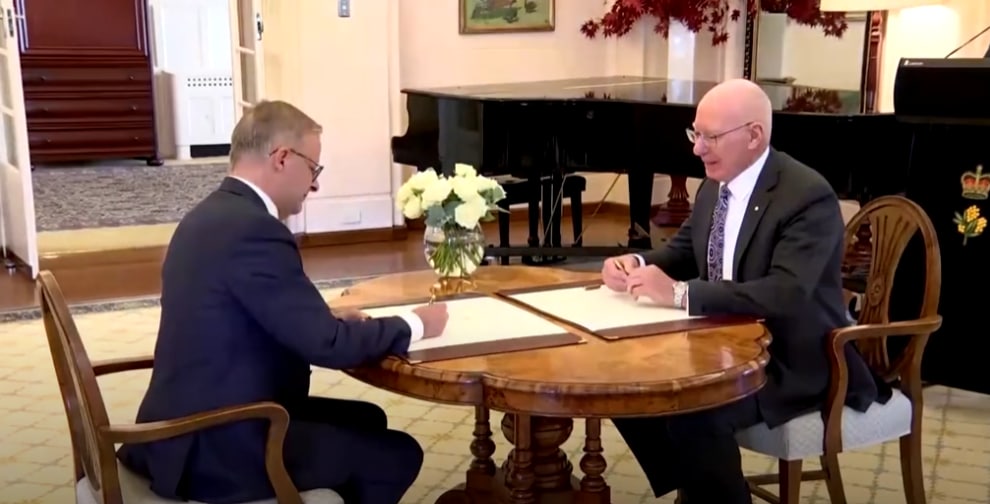INTERNATIONAL: Australia's Labor Party leader, Anthony Albanese, was sworn in as the country's 31st prime minister on Monday, promising to bring the country together after a fractious election campaign as he vowed to tackle climate change and inequality.
Labor returned to power after nine years in opposition as a wave of unprecedented support for the Greens and climate-focussed independents, mostly women, helped end nearly a decade of rule by the conservative coalition in Saturday's general election.
"I look forward to leading a government that makes Australians proud, a government that doesn't seek to divide, that doesn't seek to have wedges but seeks to bring people together," Albanese said during his first media briefing after taking charge as the prime minister.
Although votes are still being counted and the makeup of government has yet to be finalised, Albanese was sworn in by Governor-General David Hurley at a ceremony in the national capital, Canberra so he could attend a key meeting of the "Quad" security grouping in Tokyo on Tuesday.
India, the United States, Japan and Australia are members of the Quad, an informal group that Washington has been promoting to work as a potential bulwark against China's increasing political, commercial and military activity in the Indo-Pacific.
Albanese said the country's relationship with China would remain "a difficult one" ahead of the summit with U.S. President Joe Biden and the prime ministers of Japan and India.
Labor's campaign heavily spotlighted Albanese's working-class credentials - a boy raised in public housing by a single mother on a disability pension - and his image as a pragmatic unifier.
Summary Anthony Albanese becomes 31st prime minister New PM, foreign minister headed to Japan for Quad meet Australian financial markets offer muted reaction
SYDNEY, May 23 (Reuters) - Australia's Labor Party leader, Anthony Albanese, was sworn in as the country's 31st prime minister on Monday, promising to bring the country together after a fractious election campaign as he vowed to tackle climate change and inequality.
Labor returned to power after nine years in opposition as a wave of unprecedented support for the Greens and climate-focussed independents, mostly women, helped end nearly a decade of rule by the conservative coalition in Saturday's general election. read more
"I look forward to leading a government that makes Australians proud, a government that doesn't seek to divide, that doesn't seek to have wedges but seeks to bring people together," Albanese said during his first media briefing after taking charge as the prime minister.
Although votes are still being counted and the makeup of government has yet to be finalised, Albanese was sworn in by Governor-General David Hurley at a ceremony in the national capital, Canberra so he could attend a key meeting of the "Quad" security grouping in Tokyo on Tuesday.
India, the United States, Japan and Australia are members of the Quad, an informal group that Washington has been promoting to work as a potential bulwark against China's increasing political, commercial and military activity in the Indo-Pacific.
Albanese said the country's relationship with China would remain "a difficult one" ahead of the summit with U.S. President Joe Biden and the prime ministers of Japan and India. read more
Deputy Labor leader Richard Marles and three key ministers - Penny Wong in foreign affairs, Jim Chalmers as treasurer and Katy Gallagher in finance - were also sworn in, with Wong to join Albanese on the Quad trip.
WORKING CLASS CARD
Labor's campaign heavily spotlighted Albanese's working-class credentials - a boy raised in public housing by a single mother on a disability pension - and his image as a pragmatic unifier. read more General election in Australia.
Anthony Albanese, leader of Australia's Labor Party, addresses supporters after incumbent Prime Minister and Liberal Party leader Scott Morrison conceded defeat in the country's general election, in Sydney, Australia May 21, 2022. REUTERS/Jaimi Joy
Centre-left Labor still remains four seats short of a majority of 76 in the 151 seat lower house, with about a dozen races too close to call, according to television channels.
Independents or Green party looked set to win at least 15 seats, ABC election analysts projected.
So-called "teal independents" campaigning in affluent, Liberal-held seats on a platform of climate, integrity and equality, could hold significant sway.
Monique Ryan, an independent who looked to have unseated outgoing Treasurer Josh Frydenberg, said climate was the most important issue to constituents in her seat.
"We listened to what people wanted, we listened to their values and their desires, and we put together a platform that reflected those."
Albanese said he hoped Labor would get enough seats to govern on their own but added he had struck deals with some independents in which they would not support no-confidence motions against his government. The swearing-in of the full ministry will happen on June 1, he said.
Official results could be several days away, with the counting of a record 2.7 million postal votes under way.
Australian financial markets offered a muted reaction to the election verdict on Monday, with the outcome already priced in and no radical change in economic course expected.
"Our economic forecasts and call on the (Reserve Bank of Australia) are unchanged despite the change of national leadership," economists at Commonwealth Bank of Australia said.























